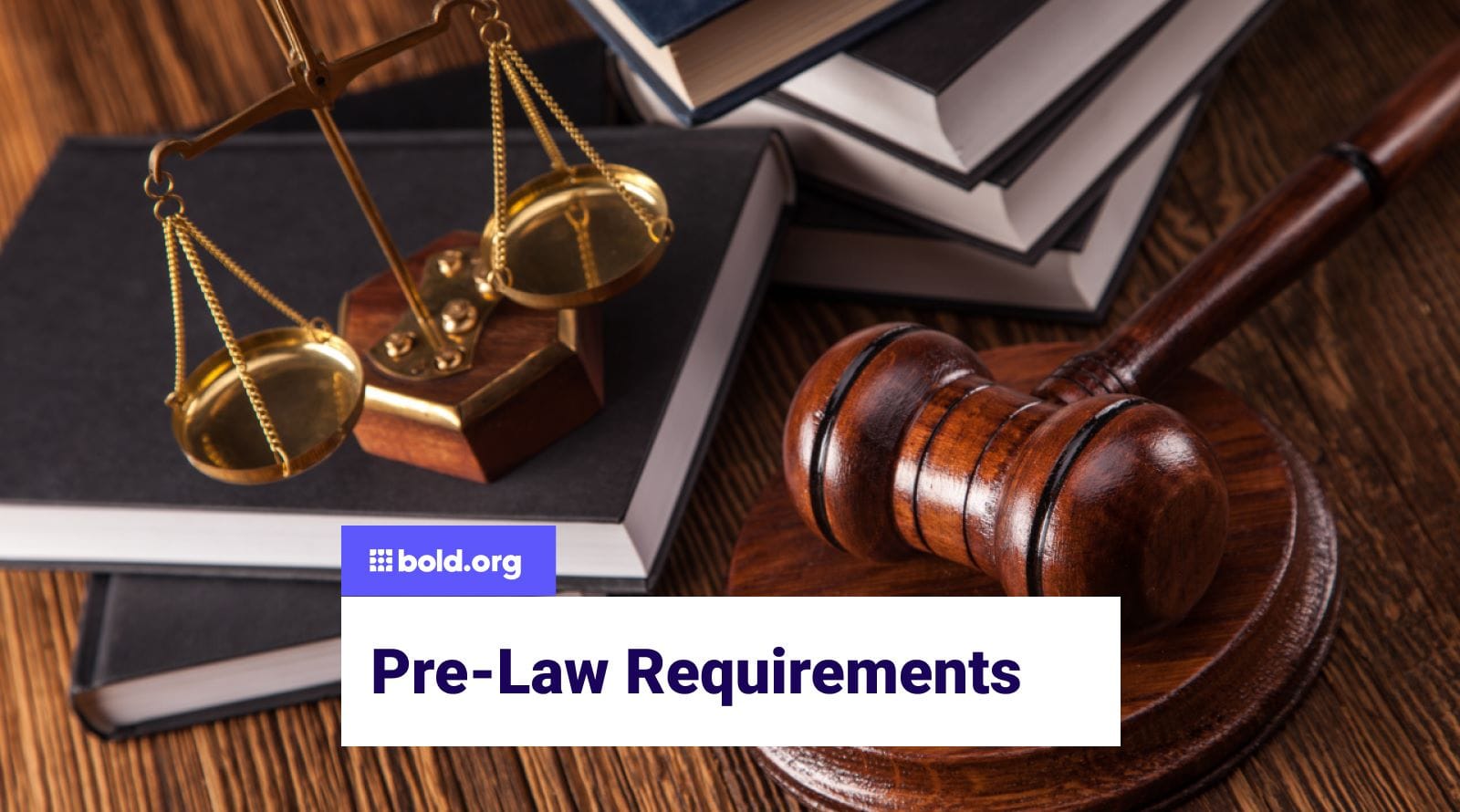Access thousands of exclusive scholarships
for free
Obtaining an undergraduate degree is an exciting and important first step toward your future career in the legal profession! Navigating pre-law can be a confusing process, but here at Bold.org, we have compiled a list of exclusive insights, the many courses a lawyer benefits from, and scholarships to help you understand what your first step should be toward your own legal career and education.
Pre-law is a popular choice for undergraduate legal education in the United States, but the process has many components that can make it complicated. This article is a guide to the standard requirements most law schools expect from applicants.
Create a Bold.org profile and use the scholarship search feature to access hundreds of exclusive scholarships.

What Is Pre-Law? Is it a Major?
"Pre-law" refers to a course of study or a pathway in college as preparation for law school. It is not a major in itself but rather a track or a set of courses to enhance students' chances of admission to law school and prepare for legal education's rigors.
Students on a pre-law track often concentrate on fields that develop skills practical for law school, such as critical thinking, reading comprehension, writing, and analytical skills.
Common majors include Political Science, English, History, Philosophy, and Economics. Still, there's no specific major required for law school admission.
Many colleges and universities have pre-law advisors who help college students choose appropriate courses, prepare for the Law School Admission Test (LSAT), and navigate the application process.
Typical Pre-Law Requirements
Law schools generally value diversity in their student body, so there is no "one-size-fits-all" approach. As a pre-law student, you can enrich your college experience with a diverse curriculum that blends courses enhancing critical thinking, writing skills, logic, philosophy, advanced English, public speaking, political science, history, economics, and sociology.
Beyond academics, you should prioritize maintaining a high GPA, diligently preparing for the LSAT, and actively participating in law-related extracurricular activities to build a strong foundation for law school.
If you want to check an example from pre-law Columbia University recommendations, advisers recommend you pick a field that interests you.

Pre-Law Courses to Take in College:
- Logic and Critical Thinking: Courses in philosophy, especially those focusing on logic, help develop critical reasoning skills. Computer science courses are also a growing field that will connect legal education with national and international institutions.
- Writing and Communication: Strong writing skills are essential for law students. Courses in English, rhetoric, or communications can improve your ability to express ideas clearly and effectively.
- Public Speaking: Courses in speech, debate, or rhetoric can enhance your oral communication skills, which are crucial for the practice of law.
- Political Science and Government: These courses offer insights into the structure and function of government systems, legal processes, and political theory.
- History: Comprehending historical contexts, especially of legal systems, constitutional history, and influential legal cases, can be very beneficial.
- Economics: Provides an understanding of economic principles and policies, which can be useful, especially in areas like corporate law or tax law.
- Sociology and Psychology: These courses help in understanding human behavior and social systems, which is useful for fields like family, criminal, and civil rights law.
- Ethics: Courses in ethics or morals are valuable for grappling with the ethical dilemmas lawyers often face.
- Criminal Justice: Provides a direct insight into the legal system, criminal laws, and the justice process.
- Legal Studies: Some colleges offer specific courses in legal studies or pre-law, which can provide foundational knowledge in the field.
- Research Methods: Any course that strengthens your research skills, particularly in legal departments, is advantageous.
- Constitutional Law: Offers an understanding of the Constitution, which is fundamental to all areas of American law.
Get Matched to Thousands of Scholarships
Create your Bold.org profile to access thousands of exclusive scholarships, available only on Bold.org.
Create Free ProfileWhat Is the Best Pre-Law Major?
There is not one single major that a law school admissions call will require from applicants or that the American Bar Association (ABA) recommends. Regardless of choice, it is recommended to take challenging courses that develop your research, critical reading, and writing skills. Here is a list of common pre-law majors that will prepare you well for a law school admissions call:
Political Science
One of the most popular pre-law majors because of how it educates students on government and legal systems. Students learn about various areas related to laws, such as public policy and international relations. These degrees are also very versatile, preparing students for a diverse set of careers in addition to helping teach skills important for success in the legal field.
History
Another great choice for a pre-law major. The study of History often explores legal proceedings, social norms, and cultural contexts, thus preparing students for law school by giving them a background and insights into legal systems throughout history.
Philosophy
Philosophy is a popular pre-law major and will give students an early start at learning analytical reasoning and critical thinking skills emphasized in the law school curriculum. Philosophy courses are an excellent way to learn the principles of ethics and arguments, subjects which are central skills for a lawyer.
Psychology
A popular pre-law major is psychology, which provides skills in research and written communication, as well as public speaking skills. This focus will also prepare students for working in the legal system by giving them unique perspectives on human behavior, and often gives students experiences in social services and other legal systems during undergrad.
Economics
Another great major for students who are preparing for law school. It prepares students for the legal profession by helping them understand legal concepts like labor laws and educating them on micro and macroeconomics. Additionally, economics majors have to excel in research and communication.
English
Studying English Literature is an excellent choice for humanities courses during undergrad, improving necessary reading, writing, and analysis skills for law school. English courses will foster an excellent understanding of language, critical thinking, literary analysis, and persuasive writing.

Best Pre-Law Schools in the US
College rankings significantly shape student perceptions. These rankings, serving as cognitive artifacts, simplify decision-making by offering a hierarchical view of colleges and universities, enabling easy comparison across parameters like location, tuition, and enrollment. This influences opinions on institutional quality, often guiding them toward highly ranked institutions.
However, an over-reliance on rankings can be problematic. It may reinforce educational inequalities, as top-ranked schools are perceived as more desirable, potentially leading to unequal access to education. Rankings can oversimplify the complexities of choosing a law school. They may only sometimes align with personal criteria for quality. Therefore, while helpful, rankings should not be the sole criterion for selecting a pre-law school.
We encourage you to consider individual needs, interests, and goals alongside these rankings for a well-rounded decision-making process.
Pre-Law Scholarships on Bold.org
Bold.org has many pre-law scholarships available for pre-law students to apply for. Below are some examples of the hundreds of opportunities at Bold.org:
- Law school scholarships
- Undergraduate scholarships
- Business scholarships
- Scholarship for incoming college students
These are just some examples of the many scholarship opportunities here at Bold.org. Apply now to begin your education savings!

Frequently Asked Questions from Pre-Law Students
What is the most common pre-law major?
Political science is one of the most popular for students who intend to attend law school to get their bachelor's degree. It studies the theory and practice of government and how it connects to the legal system in practice.
What are good pre-law majors?
Some of the most popular options for pre-law applicants to choose as undergraduate majors include psychology, criminal justice, economics, sociology, and philosophy.
What is a good pre-law GPA?
In the United States, the average median GPA of law school students entering law school across all law schools in 2021 was 3.55. However, at the 20 highest-ranked law schools, the average median GPA was 3.86. Generally, anything lower than 3.0 would be considered a low GPA to enter law school.
Should I double major in pre-law?
Law schools consider applications holistically, meaning an all-school admissions committee will look at all parts of your application to consider all of your experiences and qualifications. It is neither in your favor nor against your favor to choose courses with a double major, but it is better to have a higher GPA with a single major than a lower GPA with a double major.
When should pre-law students take the LSAT?
The latest you should take the LSAT as a pre-law student is the Summer of your Junior year or the Fall of your Senior year of your undergraduate studies. A Summer test is better than in the Fall because you will get your scores early enough to be considered in the first wave of applicants.
Do law schools care more about GPA or LSAT scores? What is a good LSAT score?
The majority of law schools in the US care more about LSAT scores when they review applications, although some law school admissions officers favor GPA.
According to admissions experts, a good score for applying to most law schools is at least 150. If you have your sights set on top schools, your goal should be 160 or better. For one of the topmost law schools, aim for a 170.
What are the best legal fields to go into?
Some types of lawyers currently in the most demand include intellectual property, family law, immigration and naturalization, real estate, business and corporate transactions law.
Which types of lawyers earn the highest salaries, and in which states do lawyers generally make the most money?
Patent lawyers are among the highest-paid types of lawyers. Patent lawyers specialize in advising clients about patents so their clients can obtain these important intellectual property rights.
In the United States, lawyers in New York make the most money, with an average salary of $85,000 and top lawyers earning $199,000. In Arkansas, they make the least money, with an average salary of $36,000, and the top lawyers in the state earn $96,000.
How can I find law school scholarships at Bold.org?
- Create Your Profile: Begin by making a Bold.org profile to access unique business school scholarships.
- Explore Scholarships: Use the scholarship search feature for a variety of options, including major-specific, need-based, and merit-based scholarships.
- Ease of Use: The platform is user-friendly, offering an easy process with hundreds of scholarships available.
- Additional Resources: For more insights, visit the Bold Scholarship Blog for articles and guidance on scholarships.
Head to Bold.org, grab easy scholarships, and keep your winnings safe with a Bold Debit Card.


